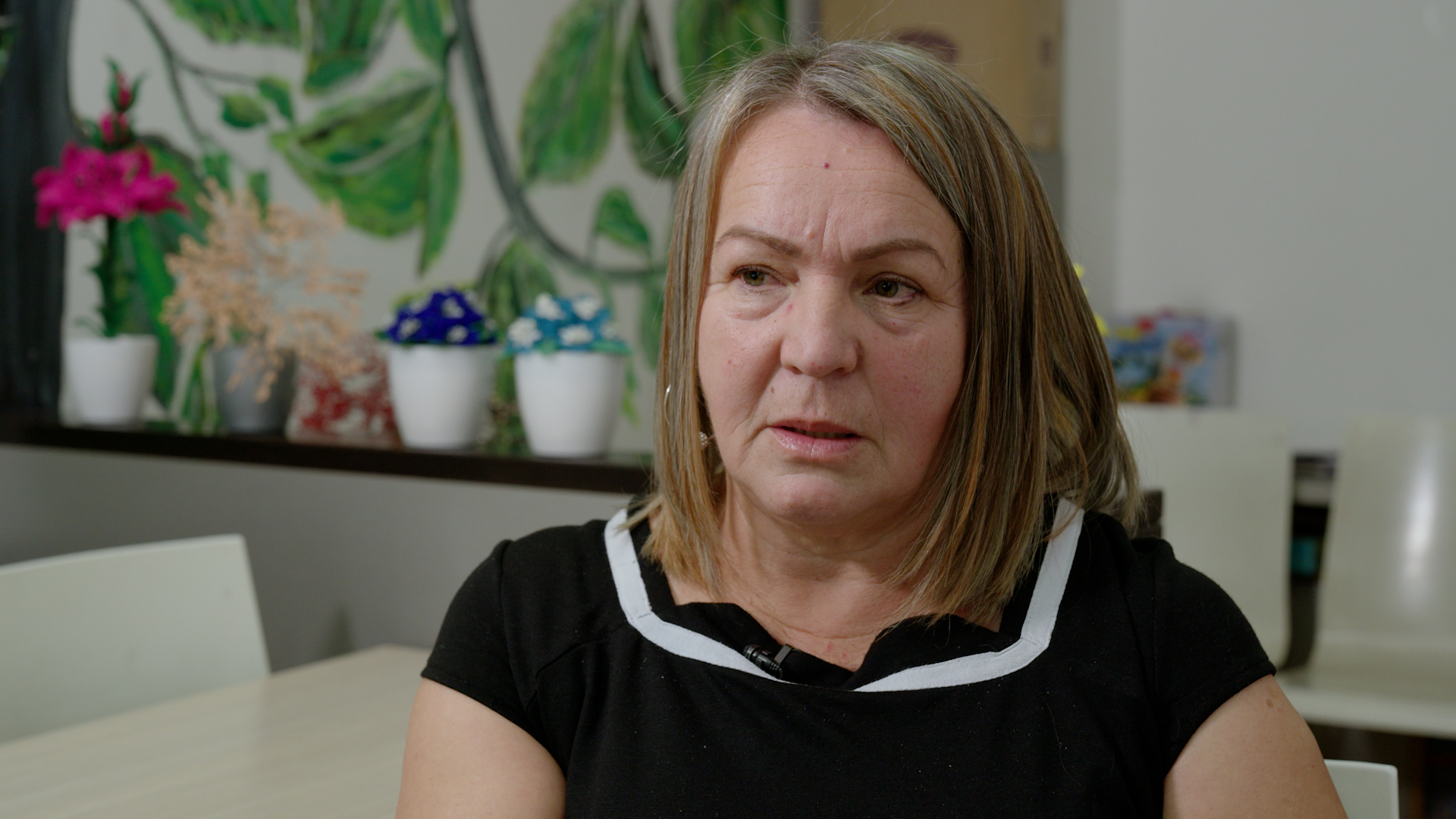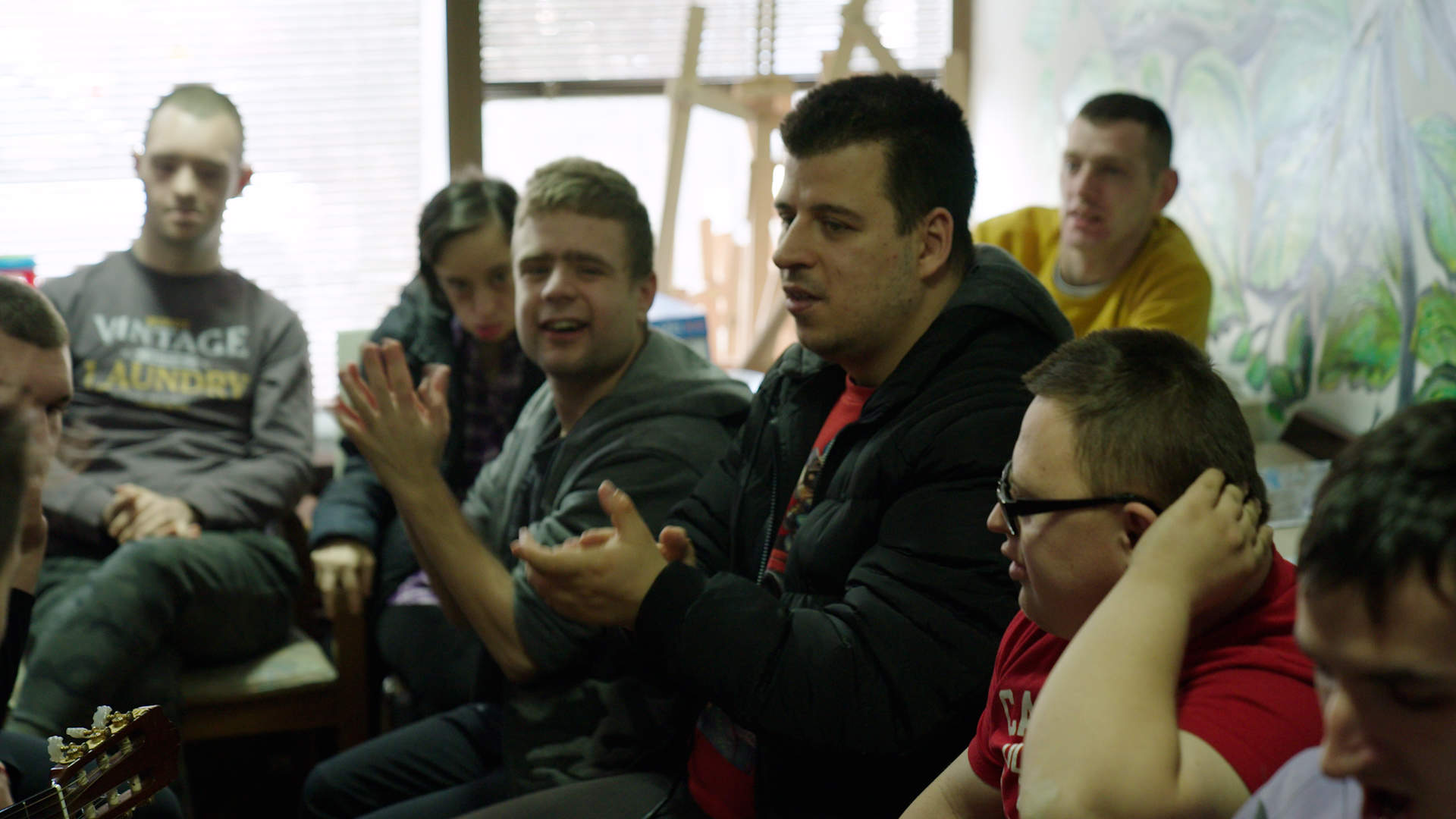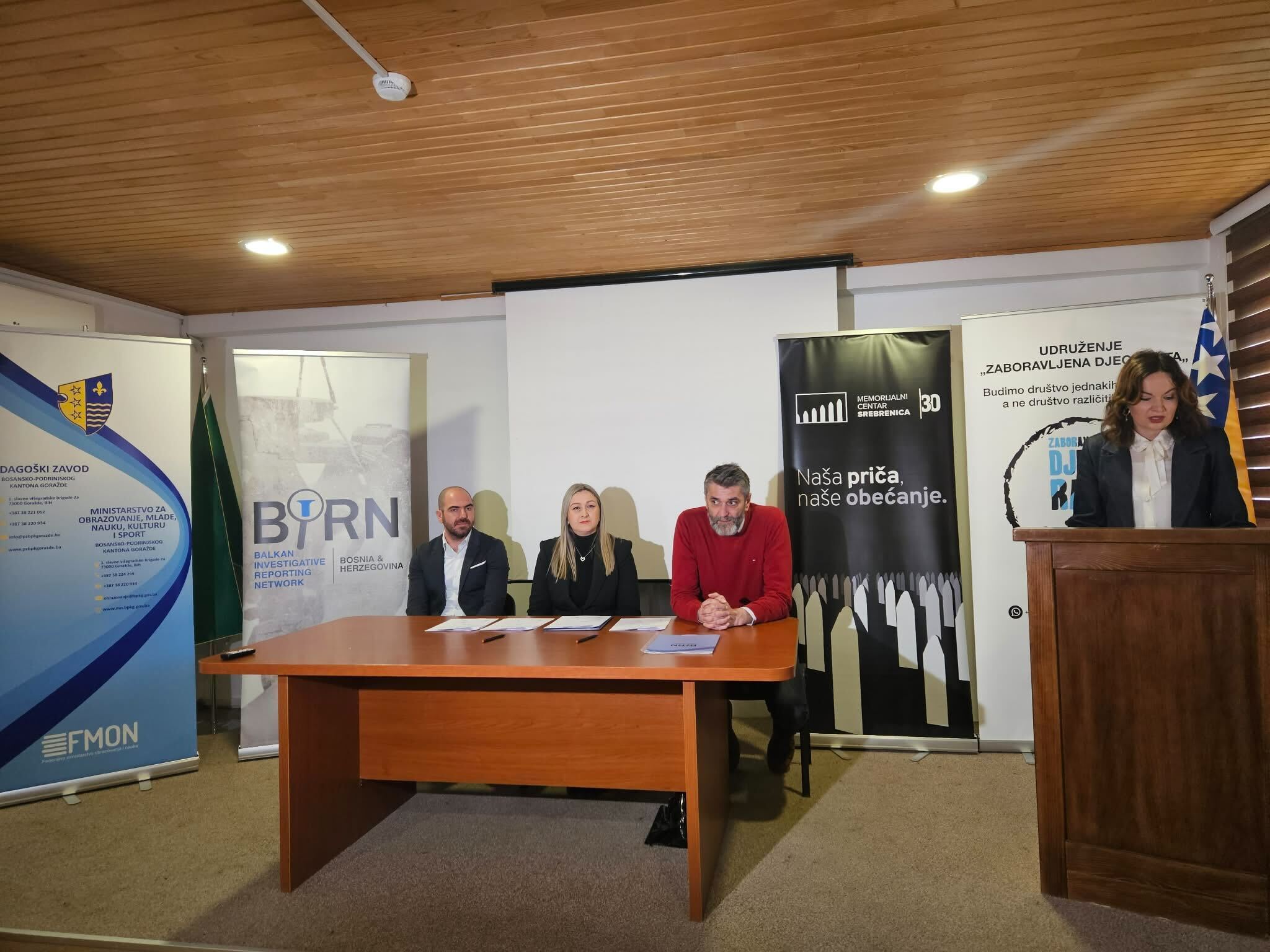This post is also available in: Bosnian
In a small room, hardly big enough to accommodate ten people, association members are using the session to try to make up for their woes – the lack of a job, adequate social inclusion and economic stability.
Twenty-seven-year-old Irma Tucic is one of them. She’s a medal-winning swimmer. Last year in Berlin at the Special Olympics World Games, an international sporting event for participants with intellectual disabilities, she came in the eighth place. That was the first time that she was separated from her parents for two weeks, she tells Detektor.
She wants to contribute to her family’s budget by working, so she sells cosmetics via a catalogue, and also acts in the theatre.
“I want to work and to have my own money, because my mother has never worked. So one day, when they are gone, I would like to be able to pay for my electricity, phone and other bills,” she said.
But for her and the other association members, domestic regulations mean they could lose the right to their welfare allowances if they get a job. For that reason, they don’t want to take any chances and have to shun paid work, which only increases their feelings of being seen as unequal.
Irma’s mother Aida Tucic explains that, besides the role of parent, she had to be a tutor, teacher and helper for her child, which is why she has never been employed but has devoted her entire life to her daughter who has developmental difficulties.
“Her upbringing was quite difficult, and we went through a lot of struggles, really, in order to be where we are now. But I don’t have any regrets at all and I didn’t feel tired all that time,” she said.
Irma completed her studies at a regular elementary school, but she halted her secondary schooling because she was told that she would be given the status of an able-bodied person after graduating. That would have been a nightmare for her family, as it would have meant that that she would not have been able to inherit her father’s pension payments after he dies, as is possible under Bosnian law – money that will be the only guarantee of her financial security once her parents are no longer around.
“After completing secondary school, she’d be considered an able-bodied person, register at the employment office and could not inherit her father’s pension,” Aida says, adding that she has never actually been given any official information about whether people with developmental difficulties’ rights to welfare benefits or to inherit a pension their parents.
Difficulties in the system
Dzevad Selimovic from Gradacac was born with type two myotonic dystrophy. His youth was difficult and tiring, he says, explaining that he had to drive around 70 kilometres to get medical checkups in Tuzla.
“My mother did not have a driver’s licence. She obtained one when I was 16 and I could already get a driver’s licence myself. She could not work. We struggled together; my brother and I and my father and mother, all of us struggled so I could grow up and be a person, be my own man and be independent,” he said.
Dzevad is now 27 and lives with his mother. He is constantly searching for a job.
“I help my mother so we can survive and live with dignity like everybody else, so our neighbours won’t say that we’re not interested in working. We want to be equal members of society,” he said.
He studied to be a chef – his greatest desire. However, he hasn’t had the chance to work in a kitchen so far.
“I worked for a non-governmental organisation, the Association of Dystrophic People, for a year as an administrative worker. People with disabilities like us can be financed through the Fund for Vocational Rehabilitation and Employment of People with a Disability,” he said.
He explained that employers give people with disabilities jobs for as long as they are financed by the Fund, but then they are forced to register at the employment office again and wait for three more years before they can apply again.
Although he has a disability, he has not been able to get disability benefits. Being registered as an able-bodied person due to his previous employment record and status at the employment office, the possibility for him to inherit his parents’ pensions has also been reduced.
Irma’s mother Aida has been afraid of that her entire life. She told Detektor that these benefits are the only guarantee for her, as a mother, that someone will take care of Irma should something happen to her or her husband.
“What will happen in the future when we’re not around anymore?” she asked, expressing the hope that her daughter can become independent.
“For all of us, Duje is something that looms above over our head,” she said.
The Duje Reception Centre is an accommodation facility for people with mental disturbances or disabilities in the Tuzla area.
Silence instead of answers

Zumra Becic, president of the Hrabro Srce Association in Tuzla, which Detektor visited, said that besides the problems related to benefits and pensions, the association faces other issues, such as the shortage of experts and space to operate.
“We have no professional staff, like for instance a special education teacher or speech therapist,” she said, although the association will get a special education teacher through one of its projects during the year.
“A speech therapist from the Health Centre is supposed to come here to work with children and we are hoping for an improvement. But it is a short-term thing, we have no long-term solutions,” she explained.
Becic said that the association has around 50 members, aged between 14 and 36, who have various educational and health issues. She believes that some of them members can do certain jobs, and that employment would contribute to their greater inclusion in the society.
“Some could perhaps do it with an assistant, others independently, but our parental concern and fear refers to the inheritance of a pension from one parent. If they work for one or several days at a company and it happens so that they leave the job or the company closes, it means they will lose their right to inherit a pension from one of their parents,” she said.
Detektor journalists tried to talk to dozens of lawyers about this issue, but hardly any wanted to speak publicly. They believe that the law is not abusive, but is set up so that it gives the system the opportunity to offer solutions.
Ana Kotur-Erkic, a lawyer and expert in legal and employment issues relation to people with developmental difficulties, explained that although Bosnia and Herzegovina has signed and ratified several conventions on the rights of people with disabilities, which are an integral part of the domestic legislation, a proper legal framework is still lacking.
“It is envisioned, as a bare minimum, that a person with a disability should receive a certain income through their family, but that right conflicts with another right, ie. people with disabilities’ right to work. In this sense, work should not only be understood as a basis for income, but as a much broader concept of equal participation within the community, interaction and actual inclusion, paired with the assumption of obligations and the personal exercise of rights, which is particularly important for all groups on the margins,” she said.
She explained however that people with disabilities are suffering because the regulations do not follow the realities of the education backgrounds of people with disabilities, who mostly have a lower level of education and fewer opportunities to work to support themselves.
Detektor did not received answers from the Pension and Disability Insurance Fund of the Federation to queries conveyed by email or telephone.
Human rights are unconditional

Lawyer Kotur-Erkic believes that the solution is a fundamental reform of the country’s pension and disability insurance mechanisms, in order to enable people with disabilities to have the opportunity to earn their own money.
She argued that people with disabilities should be allowed the opportunity to achieve “a minimum standard of living”, saying that the issue does not only affect the individuals involved, but the entire community.
She argued that people with disabilities have rights that should be inalienable. “No single human right should be conditioned by another right, which is a lesson we never seem to learn,” she said.
The Hrabro Srce Association is currently negotiating with businesses, asking them that if they hire a person with disability, they keep them on in a position until they acquire the right to their own pension so they do not depend so much on family members.
Zumra Becic’s son was educated at the Institute for Upbringing and Education of Children with Developmental Difficulties, and in view of the information that he might lose the right to his parents’ pensions, they made the decision that he would not graduate. They is not the only parents to have made such decision.
“What will these children do and where will they go? We hope that at least someone will accept them if they inherit a pension from one of their parents, that someone will at least accept them because of those financial resources, and take care of them. I mean, it’s really hard to talk about it,” she said, holding back tears.
“We fall down and then get up quickly, hoping that things will get better, and we move on. lift us up when we see them happy wherever they are.”



